“Right here is the center of all Paris,” said Arthur, standing on a flagstone in front of Notre Dame Cathedral. “From this place the city spreads out in all directions.” I closed my eyes, trying to envision Paris as a flower, with all its petals shooting out from this, its deeply rooted stem—the Lady of Paris in full bloom. “She is the most beautiful cathedral in the world, is she not?” Arthur said quietly. “She is what makes Paris special for me.”
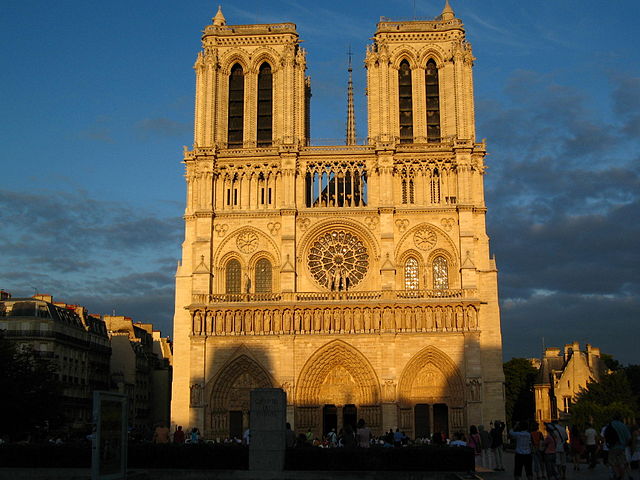
What made Paris special for me was being there with Arthur. I teach English as a Second Language at a small university in Virginia, and because my college has a partnership with a business school in Nantes, France, several French students from there have come to study English with me. Arthur was one of those.
Many years ago, before I began teaching, I traveled to Paris. I was alone and young and didn’t know the language. Sometimes when I asked for help in English, I only got what I interpreted as stares of disdain. That’s why the French have such a reputation for being rude and arrogant, I thought. But later, many years into my teaching career, when my first group of French students enrolled in my classes, I learned that I must enjoy them as individuals—that I need to discover in each of them and their unique personalities.
Since that first class of French, I have taught twenty-two others as well as over one hundred and fifty students from other countries all over the world. Getting to know each student, with his or her own character, destroys whatever cultural stereotypes I may once have held about a language group or a people. One time in class I got brave enough to admit to my French students that my first impressions of France were negative. “Yes,” they said, “some people, in Paris especially, are that way. But don’t judge the rest of us by that. We are different!”
‘What if,’ I tell them, ‘after you have gone back home to your own cities and find jobs and start families, the opportunity came for us to reverse roles, so that it would be your turn to teach me your cultures and values (and maybe even a little of your languages) while I am in your countries?’
And then I asked out of pure curiosity, “And how did you see us—Americans—when you first came to the U.S. to study?”
“Fat,” they said. “Everyone in America is fat. Oh . . . except for you, of course! You do not fit that stereotype at all! You are different!”
I teach academic English, but my students and I also spend a lot of time in the classroom discussing American culture. After all, that’s a large part of why they come to the USA—to learn about Americans, what they think, how they feel. So we talk about everything—religion, food, history, economics, politics. Through it all I correct their grammar, build their vocabulary, and tweak their pronunciation. At the end of each semester, I hug all of my students goodbye and promise them that someday I will visit their countries. “What if,” I tell them, “after you have gone back home to your own cities and find jobs and start families, the opportunity came for us to reverse roles, so that it would be your turn to teach me your cultures and values (and maybe even a little of your languages) while I am in your countries?” They smile and tell me they will be ready to welcome me when I come. But deep down we all wonder if it will really happen.
[social]
I recently opened a fortune cookie that read, “God will give you everything you want.” I laughed at the time. Does anyone really get what they want? But then, almost miraculously, a way opened up for me visit France. When I sent out my travel news to my former students, several responded to my Facebook messages. They would love to see me. Some had only a few hours to give me, some had as long as a few days, but all were enthusiastic to meet me in their cities and to teach me about their lives on their own turf. Maybe sometimes we really do get what we want.
Paris, France – Arthur
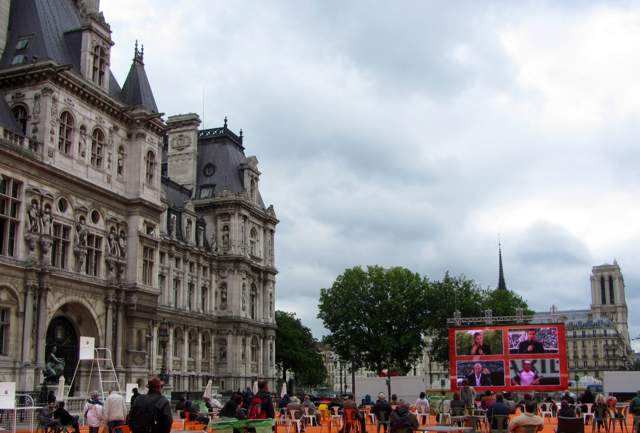
Arthur and I had arranged to find each other in front of the Hotel de Ville. At first I was afraid I wouldn’t recognize him. After all, it had been over three years since we had last seen each other. But then, his smile was unmistakable. Arthur walked up to me and gave me the embrace of the French—one kiss on either cheek. I was pleased that he chose to do this—that in France he would welcome me in this way. I never got that kind greeting from my students when we were in the U.S. together.
Although he doesn’t normally live in Paris, Arthur was staying with his brother and working for a few weeks at the Roland Garros French Open. I really enjoy both playing and watching tennis, but buying a ticket to the Open was certainly beyond my budget. I got a piece of the action anyway. Right there in the courtyard of the Hotel de Ville, the Roland Garros had set up a large seating area and a huge TV screen, broadcasting the matches free to any who wanted to come. The juxtaposition of a digital screen against the backdrop of the building that has housed French governments since the twelfth century seemed strange at first. Yet now I see that it is in this blending of old and new that France best reveals its grace.
“Do you work here, at this Roland Garros broadcast, or are you at the French Open itself?” I asked Arthur. “I work at the Open,” he said. “It is not a special job. I am just taking tickets. But I am able to use my English a lot to help the foreigners who have come to watch. Tennis isn’t something I am particularly interested in, but I thought it would be a good experience to put on my resume.”
The resume is something that all French students are concerned with. They explained to me that in America it is much easier to change jobs than in France. “Here it is hard to make career shifts,” Arthur said. “How can we be expected to know what we want to do at seventeen when we enter college? But that is what our system is like. If you graduate from a business college, you are expected to then earn your MBA. And after that you will work in your specific business field—marketing or distribution or finance—for the rest of your career.” Because of the economy, the competition for jobs is fierce, so even for young students, building a resume through internships and temporary jobs like Arthur’s at the Roland Garros is essential.
“But with the economy the way it is, how do you think people can still afford tickets to something like the French Open?” I asked Arthur. “I heard that some seats cost over 2000 Euros apiece!”
“And still,” Arthur answered, “there is record attendance at the Open this year. There will always be rich people in the world, Sara. Come, let me show you something.”
As we walked away from the Hotel de Ville, I asked Arthur what he thought was most important for me to learn about France. “Food,” he replied, without hesitation.
“Food?” I said. “That’s more important to you than history or politics?”
“Yes,” he said. “In all the time I was in the U.S. I didn’t get homesick for my parents or my house—or anything—anything but French food, especially our bread and wine.” Because I was still new to France, I naively chalked this statement up to the fact that twenty-two year old males are always hungry. But later, as I visited other former students, I learned that cuisine is very much a part of the French culture, and that enjoying food together is essential to their way of life.
My total ineptitude in French emphasized for me the bravery of these students in coming to America, in learning English, in pushing themselves far beyond the safety of their cultural boundaries.
“Okay, food,” I said. “But what else do I need to know?”
“You must start to learn French,” Arthur said. “And we will begin the lesson now.” Then he launched into a complex sentence from which I could pick out only one word—philosophie.
“Arthur,” I interrupted, “you know I can’t talk about something as complicated as philosophy in French.”
“Ah,” he said, “but you understood my sentence. You see, you know more than you think you do.” Those were my exact classroom words, coming back at me, here on the streets of Paris.
“You know,” I confided to Arthur, “My favorite word to ask is ‘why’, but here if I say ‘pourquoi’, I can’t understand the answer!”
“That must be very hard for you,” Arthur said. But then he started to laugh. And it was not a very sympathetic one.
My total ineptitude in French emphasized for me the bravery of these students in coming to America, in learning English, in pushing themselves far beyond the safety of their cultural boundaries. I hoped I could do only half as well in my travels abroad.
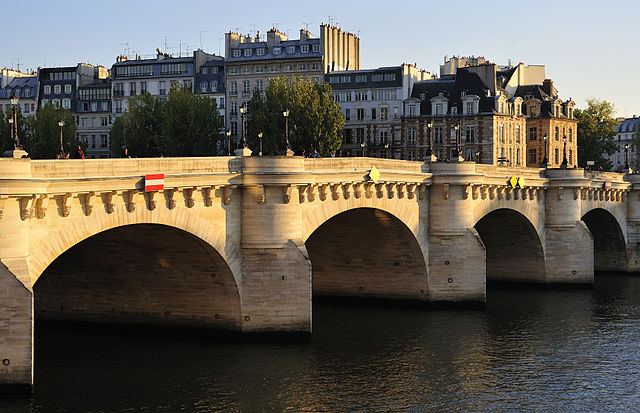
“See that island?,” Arthur said, pointing far ahead, “that is where the richest people in Paris live. We are going there. But right now we are crossing the Pont Neuf. What does Neuf mean?” he asked, obviously relishing the fact that he was now the language teacher. ”
New?” I guessed.
“That is right!” Arthur said. “But it is not very new.” Later I learned just how much of an understatement that was. The Pont Neuf was completed in the early 1600’s and named “New” in order to distinguish it from others that spanned the Seine. And now the Pont Neuf is itself the oldest bridge that crosses the river.
One more bridge brought us to the exclusive Île Saint-Louis. “Look,” Arthur said, “there are ice-cream shops on almost every corner. Why do they need so many? But can you believe there is not even one market to buy food on this island?” We bought and enjoyed surprisingly inexpensive ice-cream cones, given the real estate all around us. Small flats on the Île Saint-Louis range between one and three million Euros.
And then as if to illustrate even more extravagance, Arthur took me to the Louvre. “The Paris house of the king,” he announced. “Really?” I said. I felt so small, partly because the size of it all astounded me, but partly because of my ignorance. I only recognized the Louvre as the largest museum in the world. I had not thought of what it must of been before it became that. “Which bedroom would you prefer, Madam?” Arthur asked, sweeping his hand across an expansive wing. And then he shrugged his shoulders. “Who needs all this space? The King probably got lost each night just trying to find his own bedroom!”
Just a short walk from the Louvre brought us to the smaller of the Arcs de Triumph. “What do you think about Napoleon?” I asked Arthur.
He did not hesitate. “Napoleon was a great man. A lot of French wouldn’t agree with me. But I believe he did much good for France.” My image of Napoleon is like a cartoon character—a short guy with a wide hat and plume, his hand stuffed into his vest. Arthur’s is more concrete—a real man, a man of action. “My brother is in the military, and he trained at a base that Napoleon built,” Arthur said. “Napoleon tried to make France strong. And he brought many freedoms to the common people. That’s why some of the nobility didn’t like him.”
Our tour of Paris came to an end, and throughout every moment of it I felt Arthur’s strong connectedness to all that is France. His French roots run as deep as Notre Dame herself, and I couldn’t help but envy this twenty-two year old and his ability to look back over long stretches of time, identifying with his own people and their history, in a way that I, a drifting American who has already lived in ten states and has no real sense of heritage, will never be able to experience.
Check out our Paris Indie Travel Guide and find a flight to Paris
Bordeaux, France – Audrey
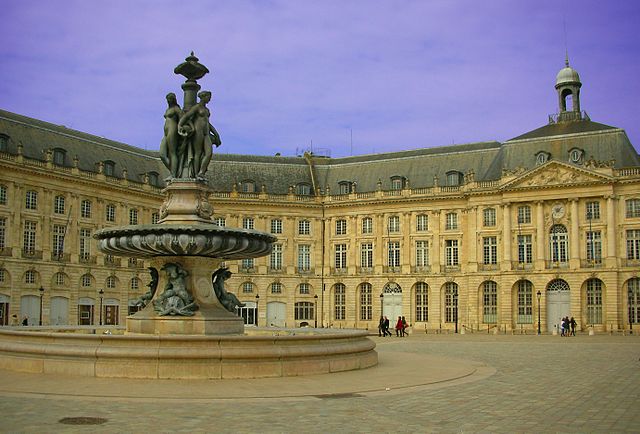
It is this very sense of connectedness that Audrey seems to want to break free from. After she spent her semester in America and graduated from her French business school, she didn’t enter a graduate program right away. Instead she and her boyfriend at the time took an extended trip to Portugal, camping in the car and roving from place to place as the mood took them. In my mind, I call Audrey the Wild Child. Certainly she is more free of worry about her future than any of my other French students. But it wasn’t always that way.
“When your parents bleed from both arms to send you to school, to give you life, then it is so hard to not feel the weight of that—the responsibility of living up to what they want for you,” Audrey told me. “But I was unhappy with my options in the business world, and I wanted to travel—to discover more about the things I really care about. So, I decided to support myself through working in a restaurant, save money, and then travel as I can. It’s so much better to learn about the world by moving through it than by reading about it in a classroom.”
Audrey would know. She is enrolled in a Master’s program in Political Science in Bordeaux, which is why she is living in that city. And really she is much more complex than the typical Wild Child persona. When Audrey was at my school in the U.S., she was one of the most inquisitive students I had—bright and alert, always asking questions. When I am with her, I feel a sense of kinship. I, too, ask questions and need to search for answers. It is this that also pushes me to travel.
Audrey is putting her Political Science degree on hold in order visit Asia this fall with a friend. “Right now I am living off my tips and am able to save all the rest,” she told me. “That will give me enough for a few months in Asia at least.” Unlike in America, where most restaurant servers are only paid a couple of dollars an hour and must rely on tips in order to make enough money to live on, in France restaurant workers earn minimum wage. Tipping is optional.
We were seated in an outdoor café where Audrey had asked me to meet her during her midday break from her restaurant. While Audrey rolled a cigarette, we ordered Perrier tranche (Perrier with a slice of lemon). I took a long look at Audrey over my glass and couldn’t help but compliment her on how healthy she looked—how much lighter and freer she was than when I had last seen her in America. “I am a completely different person,” she said. “Not worrying about my future and what I will someday be in life has taken off so much of the pressure.”
It is the attempt to speak the language of the country you are in that is more important than the result.
I asked her to teach me to say, “Perrier tranche, s’il vous plait,” so that I could order another one for myself. I practiced over and over but said, “see vu play” every time. “Why can’t I pronounce that L?” I asked, frustrated with myself.
“It doesn’t matter,” Audrey said kindly, “We French eat letters all the time. When the waiter comes, just do your best.” But when the waiter actually stood above me, all that came out was, “Perrier, see vu please.” To their credit, Audrey and the waiter only smiled indulgently. It is the attempt to speak the language of the country you are in that is more important than the result.
After we finished our drinks, Audrey asked if I would mind accompanying her to her doctor’s appointment. We only had two hours together, and I wondered if we would waste our whole time in a waiting room. But the office was empty when we arrived, and Audrey went right in for the exam. She was out ten minutes later. Granted this was a simple physical, required by law, to make sure Audrey was healthy enough to work at her new restaurant job. But I couldn’t remember any time that I had ever been to a doctor’s appointment where it took less than an hour.
“This is a special doctor,” Audrey explained. “He only checks people for their job requirements. My company set up the appointment, and they also pay for it. Other waiting rooms for sick patients are not completely empty like this. But overall I think we have a good healthcare system in France–for all the people.”
This seemed a good moment to asked Audrey about her political views, but she just said, “There are two things French families and friends don’t talk about with each other—money and politics. I don’t agree with being quiet about money, but you can ruin good friendships when you discuss politics.” Then, politely and firmly, she changed the subject. “Let me show you my Quarter now.”
The Quartier Saint-Michel is one of the most diverse sections of Bordeaux, and Audrey loves its international feel. “They say that there is a restaurant here for every day of the year,” she told me, “with all different types of food. There are over 300 restaurants in this quarter alone!” Then her voice changed tone. “We don’t know what will happen to the Saint-Michel. Bordeaux wants to renovate it, but most of the people who live here are against that. The improvements will make the property values go up, and many residents will have to move out because they cannot pay the higher rents. That is happening in many quarters of many cities all over France.” For a moment we were silent, inwardly asking ourselves the same question. Then I voiced it for both of us.
“But where will all the people go?”
And she echoed the sadness we both shared with a simple, “I don’t know.”
Audrey is passionate about the disenfranchised. Someday she thinks she might like to work in micro-finance, where bartering is a large part of the local economy. I mentioned to her that I keep about $25 in circulation through an organization that gives small business owners interest free micro-loans. My paltry contribution doesn’t go far by itself, but because it is added up with others who donate, a man in Paraguay can buy needed supplies for his car wash business. Audrey’s eyes brightened. “Yes, that is the kind of thing I want to help with!”
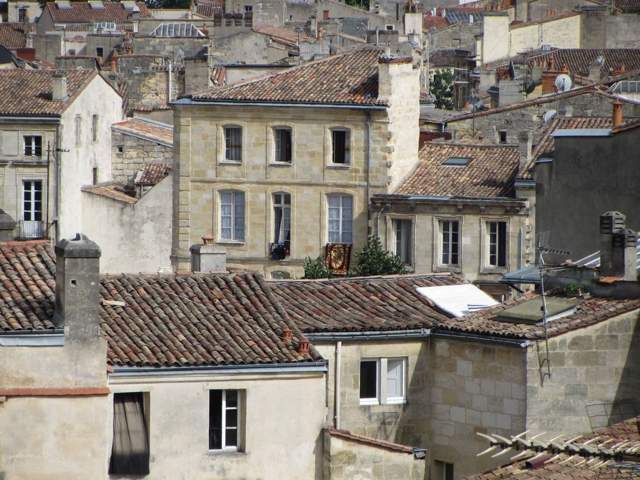
There are many flats in the ancient buildings in the Quartier Saint-Michel, and Audrey invited me up to see her fifth floor studio. Then we went even higher, climbing through the skylight and out onto the roof itself. Audrey leaned back onto the slate tiles and breathed in deeply. “When I need to relax, I come up here to sit and smoke and think,” she said. “It is so peaceful. See that mattress over there? My friend put it on his roof so he can sleep outside sometimes.” Then she turned and pointed in a different direction. “What do you think of the view?” she asked. “Isn’t it just like being in the movie, Mary Poppins?”
And it was. This was a magical height and size and shape of France that I never would have viewed if it weren’t for my Wild Child coaxing me up onto the roof of her world.
Check out hostels in Bordeaux and read Round the World Trip for Foodies
Read more inspirational travel stories from normal people who have made travel a top priority and check out resources to help you do the same:
- Stop and Smell the Daffodils
- Travel in India: A Healing Journey
- Confessions of a Lifestyle Traveler
- Getting Your Boots Dirty: How Volunteering in Africa Changed Me
- From Cubicle to Coffee Shop: How Living in Santiago, Chile Changed Me
- Why We Decided to Road Trip Across Europe in a Self-Built Campervan
- Travel Made me Who I Am Today
- How a Dog Walk Changed My Life Forever
- Why You Should Forgo the American Dream and Let Travel Transform Your Life
- Getting Outside The Box: One Family’s Journey to Full Time Travel
- Check out our RTW Traveler Profiles and fill one out yourself
Photo credits: Hadonos, Rog01, A. Bacquias, all others courtesy of the author and may not be used without permission.
